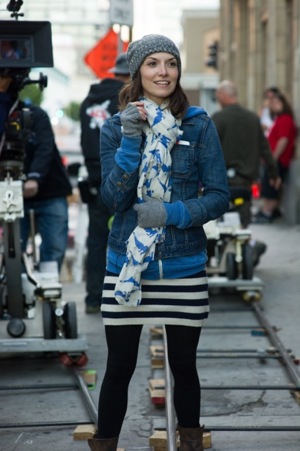
Lorene Scafaria Writer and Director of “Seeking a Friend for the End of the World” chatted with me on June 5, 2012.
Sarah Knight Adamson: First of all, I have to commend you on writing a very original screenplay. It’s not often we see a mixture of drama and comedy. How did you come up with the idea?
Loraine Scafaria: The idea’s been circulating in my head for probably a decade by now. There was a great rash of the end of the world movies at the end of the 90s that sparked that thought, “Well what if you just took the every man in this scenario?” He wasn’t trying to stop the end of the world from happening but he was trying to cope with it and to see him in his everyday relationships with people. Then, 911 happened and I had moved from New York to Los Angles the week before and knew nobody. I was stranded out there and desperate for human contact. In thinking of what was more important you really saw a change in human behavior. New York city was really different for a while. People were actually looking at each other in the eyes on the subways (laughs). There was a sense of community. The scary way that death is really this equalizer. You got to see first hand that when you put everybody in the same boat, we are actually all in it together. That was sort of the start of things. Around 2008, before Nick and Norah was coming out, I really wanted to tell a love story that had a very loud ticking clock, you know (laughs)? Where it wasn’t just one night that would go on forever but what would happen if you took forever off the table? What would that do for a love story? I got really excited about exploring what kind of characters would face the end of the world and tell this kind of story in the right way.
You directed two big names, Steve Carell and Keira Knightley. Can you tell our listeners a little bit about their characters?
Steve Carell plays Dodge who is a bit of an every man. He is an insurance man when the film begins and upon hearing of the word that an asteroid was going to hit the earth in exactly three weeks his wife leaves him. So, he’s forced to think about what he’s going to do alone for the rest of time, which is only three weeks. As a man who has always chased the past, in a way, and certainly not lived in the present he decides that finding his high school sweetheart is what he wants to do with the next few weeks.
His neighbor Penny is played by Keira Knightley. They don’t really know each other before this. They certainly are people who would have walked the same halls and not paid much attention. She’s a little more of a free spirit and someone who has lived her life more to the fullest than he has but has a certain amount of regret in terms of seeing her family. So, her goal is to see her family again. Both of them set out on their separate journeys together and meet a bunch of weirdos (laughs).
I can’t help but point out that the film worked so well for me. I really stopped to think a few times like, “Wow, what would I do?” I don’t know if this is in the movie but there was a point when I thought, “Oh my gosh, I haven’t taken that yoga class yet!”
LS: Well, Melanie Lynskey plays the character when they’re all going around the table talking about what they’re going to do she says she’s actually going to take that pottery class. That might have been the moment. I do love that not everything is doom and gloom. Not everything is desperate measures. Some of it is like, “Oh man, I should have just gone on that hike and seen that view from that mountain.” It’s funny, I did ask a lot of people when I was doing human research what they would do. Some people said they’d just go back to work and hope that their employees would be there. Others said they would go insane and do heroin. It was interesting to get a real mix from people I know.
I think your film really brings that out. There are ideas that I hadn’t even thought of…and behaviors.
LS: Well, death in general, everybody faces it so differently. When I’ve gone through my own stuff like that, I feel there are those moments when you really see who your friends are. Or, you really just see how much people can handle and how people process death. It is so individual for everybody that I thought the response to this film would be so individual because it really does depend on your own thoughts. I don’t mind that people disappear in their own thoughts and think about their own lives and come back to the film. I always hoped it would spark those kinds of thoughts for people.
The film is comical as well. I want listeners to know that. Also, I want to point out a very touching scene between father and son, Steve Carrel and his father Martin Sheen. That scene was amazing. Why did you decide to include something like this in the story?
Well, I like the idea that she is actually seeking her family along the way and she comes across some exes. He is in search of his high school sweetheart and ends up finding family along the way. I really do think that with a character like that, someone who has been guarded their whole lives and not really living – something happened to kind of put them in that shell. I don’t think we ever outgrow our parents. It’s never too late to have that kind of closure or hear something new or learn something and see it differently. It’s important to me that he found a sense of peace in a way. In finding peace he could do what he needed to do and end up being brave. Which is something that is a learning process (laughs).
I really appreciated that element of the film. That was a good lesson. It’s never too late. I also thought that music was a big part of the film. I love the vinyl records. They’re such a novelty item to films. Did you talk about the richness of the sound?
LS: Yes, that’s when Penny is talking about the records. There is something to that. You can’t really get that quality. I mean, there are many high tech ways to hear every nuance of sound but it will never have the same texture as a vinyl record. I can’t believe that I went through tapes and CDs and now those are so archaic. The idea that these possessions that people have are so important…people’s collections. When you think about what you want to consume at the end of the world besides each other and food, I feel like the thing people want to do more than anything is hear their favorite songs, feel nostalgic and feel with memories. Music is such an important part of my life. It seems to be an important part of almost everybody’s lives. For me, it’s like the old days of people watching the radio or something. It is different from playing music on your iPod. I have a friend who has a record player and when he puts records on we just sit there and actually absorb the music. It’s a completely different listening experience. I’m not so cool, I don’t have my own vinyl collection (laughs). I think I only own the Nick and Norah soundtrack on vinyl but that’s as far as my collection runs. But yes, to be able to appreciate it that way…and any music head seems to know that it’s a different form of appreciation.
The sound is just so unique. Was there a significant with the harmonica?
LS: There was. When I was first writing the script I was thinking of it as a Western. I was thinking of the asteroid coming and the posse up on the hill and how you can’t really outrun your fate. I was sort of infusing a bit of western into Dodges’ life and I started to think of him and his relationship with his dad. When I first wrote it I just remember it’s like, “Okay, he has the harmonica and plays at camp and then I realized this is his singular instrument.” It’s just a lonely man at a campfire kind of an instrument. I liked giving him something he could hold in his pocket that was meaningful even if we didn’t need to know the full breath of it. The idea that you see the engraving in it later…it all came from the idea that this was a Western to start. It obviously isn’t a true Western.
I love the patchwork quilt! It was in several scenes. Is that anyone’s personal quilt?
LS: You know what’s funny, I gave it to my mother after the shoot so it’s now my mother’s personal quilt. She got a lot of gifts from the film. It’s more a sign of comfort and I like the idea that it was personal to her. When we were shooting there were ways of making these items, the characters and the back-story in a way – even though we never fully explain. I just think that security blanket of sorts is something that all people want to wrap themselves in like a cocoon (laughs). It’s so funny, I met a girl at a party recently and she was carrying everything that meant anything to her in her purse. She had lost her family and so she was like, “This is my mother’s this, this is my father’s this…” I just thought its such an amazing thing that we all do this. I got my grandmother’s spoon collection, which is actually in the film in Penny’s apartment. For that very reason, we have these things that are going to go nowhere but that they mean so much to us from older generations. Quilt living feels like nostalgia to me.
Well, we are running out of time but I wanted to ask if there is anything else you’d like to say about, “Seeking a Friend for the End of the World?”
LS: I just really hope people go and see it and enjoy whatever thoughts and feelings it inspires. If you laugh and cry, great. If you just sort of think a bit about time and how it’s being spent then I’ll be happy.
Lorene, I want to thank you for chatting with us and best of luck with the film!
Sarah Knight Adamson ©June 5, 2012
